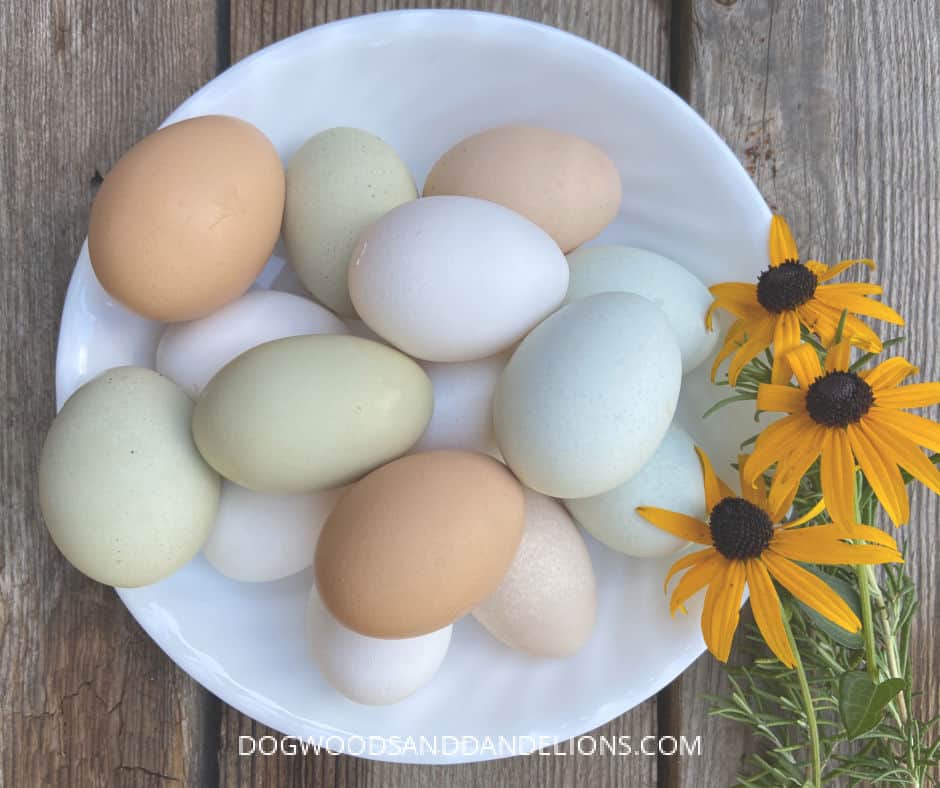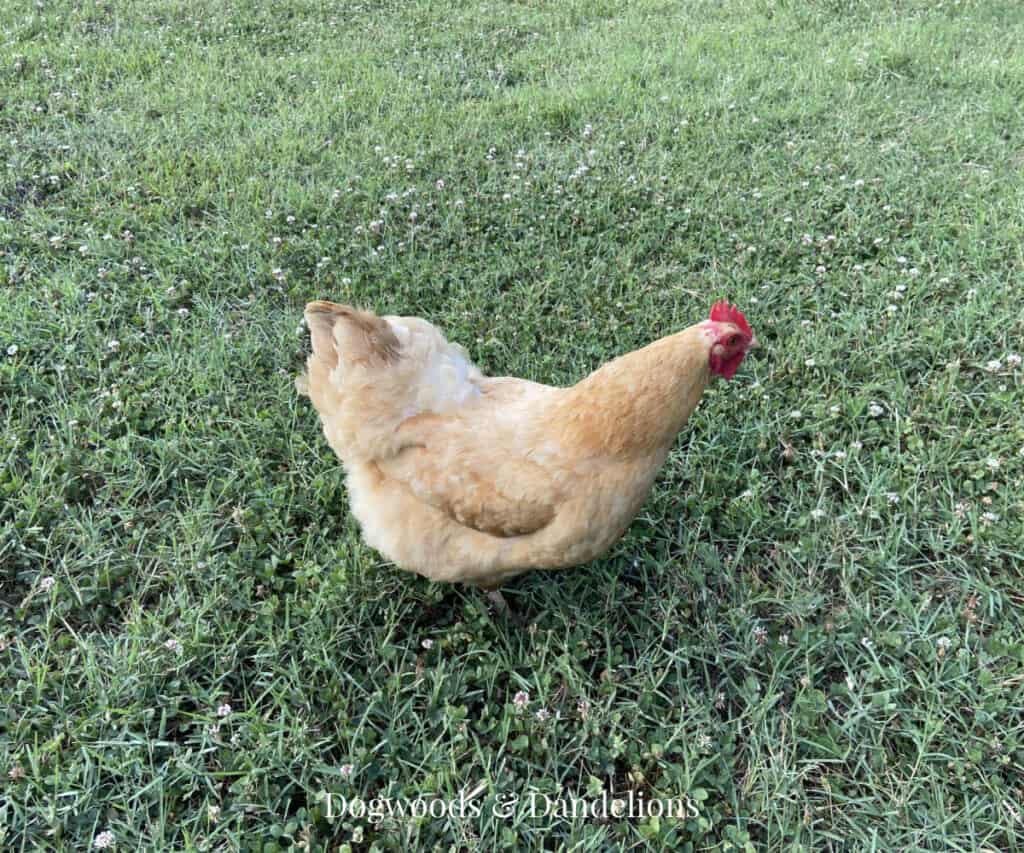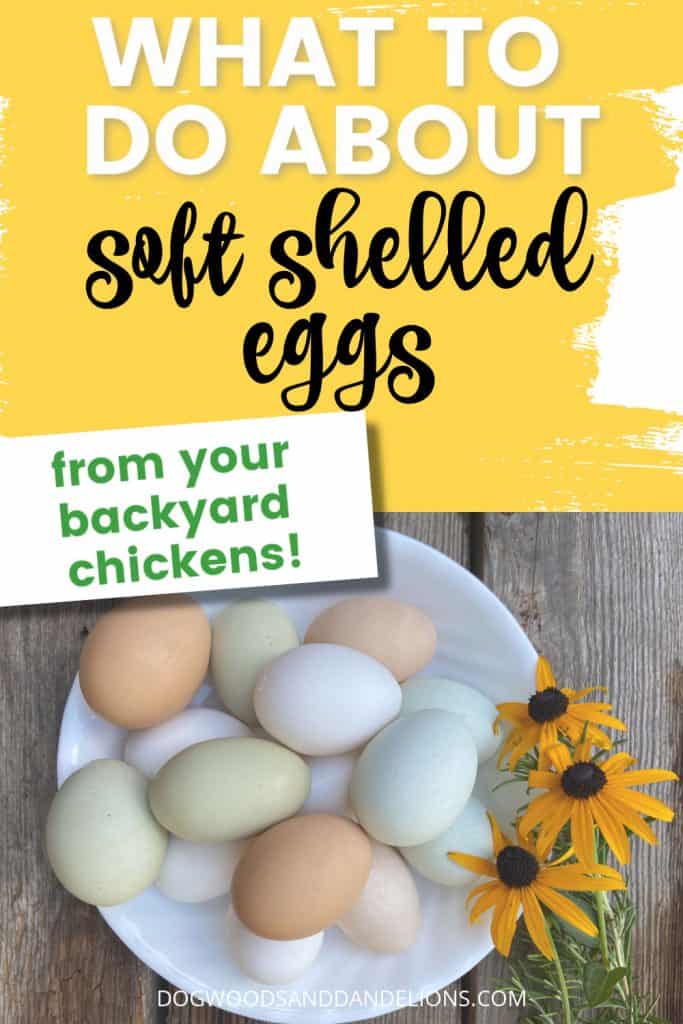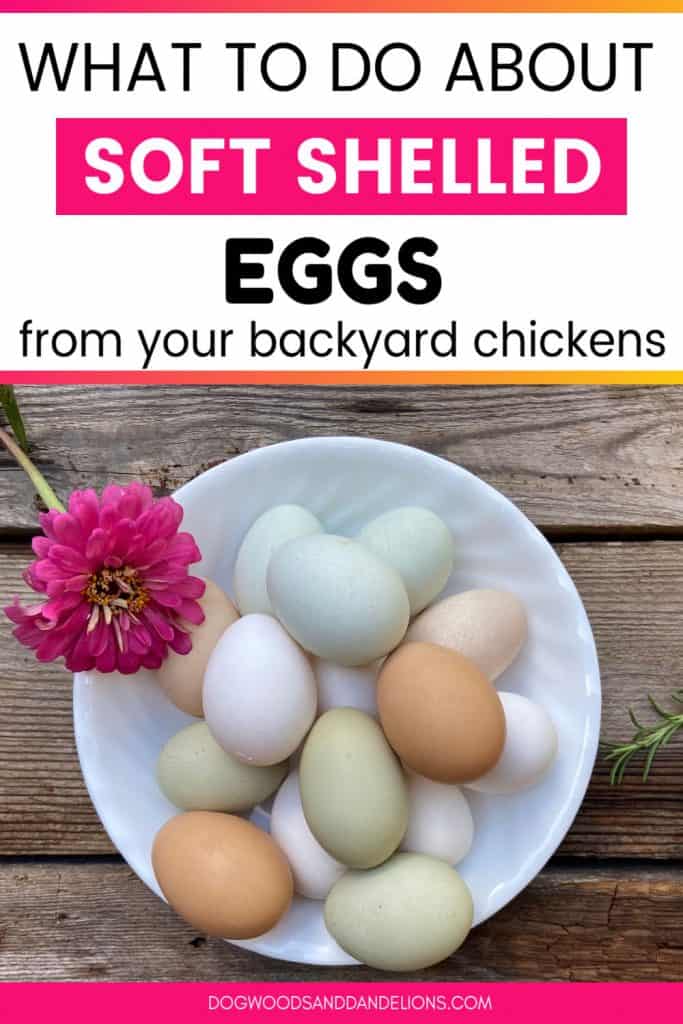Why Are My Chickens Laying Soft Shelled Eggs
Inside: Learn what to do if you find a soft shell egg in your chicken coop.
Most backyard chicken keepers will, at some point, discover an unusual egg in the coop. The most common egg oddities are either thin shelled eggs or soft shelled eggs, sometimes called rubber eggs.
Occasionally you may even find a shell-less egg. So what do you do when you discover one of these unusual eggs in the nest box? And is it safe to eat the egg?

Affiliate Disclosure: Please note that some of the links in this article may be affiliate links and I may receive a small commission if you purchase something through a link. It will not change your cost. As an Amazon Associate, I earn from qualifying purchases. For more information, see my disclosures page.)
Causes of Soft Shelled Eggs
There are many causes of thin or soft shelled eggs, but they usually are related to one of 3 things – stress, lack of calcium, or age of the chicken.
Occasionally illness can be the cause of soft or thin shelled eggs, but since there are so many chicken diseases, that’s outside the scope of this post.
How Stress Causes Soft or Thin Shelled Eggs
One common cause of thin eggshells is stress. Stress comes in many forms in chickens, just as it does in humans. And anytime a chicken is stressed it can cause them to lay unusual eggs.
If you keep roosters, an overly aggressive one can cause stress if he chooses a favorite hen and tries to mate with her too often.
A chicken that is lower on the pecking order can be stressed due to constant bullying by other members of the flock. If she has nowhere to hide, the hen-pecking of others may stress her to the point where she lays mishappen eggs.
Another factor that could cause stress in laying hens is predators. Animals trying to attack your chickens will cause undue stress on your flock.
And remember, while the predators may come at night and disrupt the hen’s sleep, it could also be something as simple as the neighbor’s dog barking at them regularly.
Read more: Chicken Predators
A third stressor is the heat. Chickens have an internal body temperature of about 107 degrees. So they feel the heat more than we do.
They can’t shed their feathers (except during a molt) so they have no way of cooling off easily. Imagine wearing a sweater on a 90 degree day.
The heat will cause your chickens to eat less, have less energy, and lay fewer eggs. And some of the eggs they do lay may have thinner-than-normal shells.
Extreme heat can quickly cause heat stress and reduce eggshell quality in a matter of days.
Read more: How to Help Chickens Beat The Heat
Lack of Calcium
A lack of calcium in a hen’s diet can also cause thin or soft shelled eggs. This can be caused by many things.
If the chicken isn’t being fed a proper layer feed, the hen may not be receiving the nutrition it needs. Even if you free-range your flock, you should always provide them layer feed to support their diet.
Feeding too many treats to your chickens can also lead to a calcium deficiency in a hen’s diet. While a small handful of scratch occasionally is fine, it shouldn’t be a large part of their regular diet.
Even feeding your chickens too many leftover table scraps or garden scraps can cause your chickens to have an unbalanced diet without enough calcium.
The Age of The Hen
The third cause of soft shelled eggs can be from the age of the chicken. When young chickens start laying, their body is sometimes not prepared for the rigors of laying an egg everyday.
So as their body gears up for egg production, you may find some unusual looking eggs in the coop. This is generally nothing to worry about in young layers. Usually, the hen’s body will work out the problems in a few weeks.

But older hens can lay eggs with thin shells too. Over several years of laying eggs, the hen’s egg size tends to increase. So now, the same amount of shell is being used to cover a larger egg.
And if the hen isn’t getting enough calcium in her diet, it will start to be taken from her bones to be used for the eggshells.
How To Help Your Chickens That Are Laying Soft Shelled Eggs
If you occasionally have an egg with a thin shell, it is probably nothing to worry about. Sometimes, it is just a malfunction of the hen’s reproductive system, quite common in young hens who have just started to lay.
However, if it is happening on a regular basis, you need to take action. You don’t want to continue feeding a hen that is laying eggs you can’t eat. And it isn’t healthy for the hen to continually lay unusual eggs either.
Eggs that have thin shells are also more likely to break in the nesting boxes and this can lead to an egg eating problem among your flock. (If you do get an egg-eater, learn how to stop your flock from eating all the eggs.)
So How Do you Stop or Prevent Your Hens From Laying Thin Eggshells?
Increase the Calcium Available to Your Flock
First, if you aren’t supplementing your hen’s diet with calcium, you need to start. Whether you free range your flock or they are confined to a coop and run, they should have access to calcium.
Even good layer feed doesn’t always provide the necessary calcium in a chicken’s diet. You can supplement by feeding the hens their crushed egg shells back to them or you can purchase oyster shell.
Either of these options will provide your laying hens with extra calcium in the form of calcium carbonate to make strong eggshells. Whichever option you choose, it should be available to them at all times.
Don’t mix it into their feed as different birds may need different amounts and roosters don’t need it at all. Just offer the supplemental calcium free choice in a separate container.
If you plan to use your egg shells, it’s a good idea to rinse and dry them and crush them up somewhat. They don’t need to be super fine though.
Many places recommend heating them first, but I see no real benefit to doing so. Your flock has already been exposed to anything on the egg shells.
However, I don’t recommend feeding your chickens egg shells from store-bought eggs or even other backyard chicken keepers.
While your hens have been exposed to whatever is on the shells from your own chicken yard, they don’t necessarily have an immunity to what could be on egg shells from other flocks. This post from Lisa Steele of Fresh Eggs Daily has some more great information on feeding your chickens crushed egg shells.
Add Apple Cider Vinegar to Their Water
You can also supplement the chicken’s water with some apple cider vinegar. Apple cider vinegar can help your hen’s body absorb more of the calcium.
Be sure not to overdo the vinegar though. One Tablespoon per gallon of water is sufficient.
Reduce the Amount of Treats
If you have been supplementing your chicken’s diet with treats, it is a good idea to stop until your hens are laying normal eggshells again. It is possible that they are eating too many treats and not eating enough layer feed to provide a healthy, balanced diet.
After several weeks of increasing your flock’s calcium intake, your hens should be back to laying normal eggs with hard shells. If not, you could have a sick chicken or one with a vitamin deficiency. You may want to speak with a vet or a trusted poultry expert to rule out any health issues.
Is It Safe To Eat Soft Shell Eggs
Generally, if the shell is intact and it is just thin, there is no reason you can’t eat the egg. However, do not eat eggs with any cracks or holes in them as bacteria could have had a chance to make their way into the egg while sitting in the nesting box.
Eggs with soft shells (rubber eggs) should not be eaten. An egg shell’s purpose is to keep bacteria out and without a proper shell, there is no way to ensure the safety of the egg. It isn’t worth taking a chance on someone getting sick over a single egg.
So don’t stress over the occasional soft egg shell. It is completely normal to see a few egg abnormalities every now and then from your backyard flock.
However, if you notice more than one, you do need to take action. The above suggestions should help you get a handle on thin or soft shelled eggs that you encounter in your backyard chickens.
Related Posts
- Learn the pros and cons to free ranging your chickens.
- Should you light your chicken coop in the winter?
- How to help your chickens stay cool in the summer?

Meet Julie
I’m a farm girl born and bred in North Carolina. I’ve been growing a vegetable garden for over 20 years (and helping my Mom grow hers even longer). I’ve been raising chickens in my bathtub and backyard for 12+ years. I believe that homegrown food can be made simple. Let’s get started.




Thank you, I’m trying to learn more about rubber eggs. I have a hen, that has been dropping them at night, around 7pm. They land in the poopshoot. We give crushed egg shells and oyster shell. We have found maybe 6 or 7. Any ideas?
There could be any number of things causing the hen to lay rubber eggs. Anything from stress, to a change in diet, or even illness can contribute to it. It sounds like you are doing the right things. Make sure you are feeding a balanced chicken feed and not giving too many treats. Sometimes it just happens if the hen is old or if it is from a pullet that just started laying. And it will take a while for the oyster shell to make a difference. Always offer it free choice so they can take what they need. Good luck!